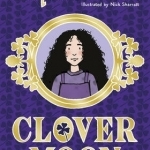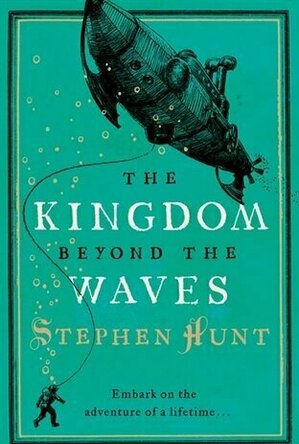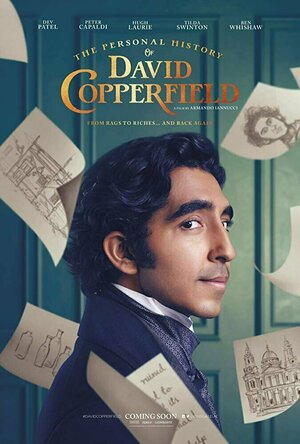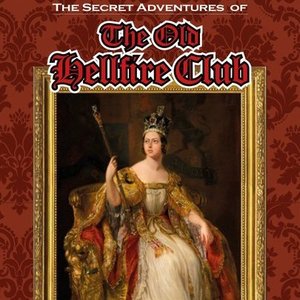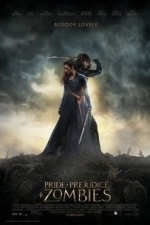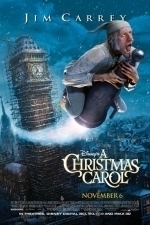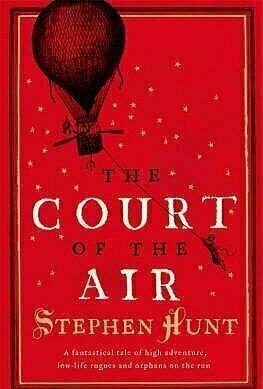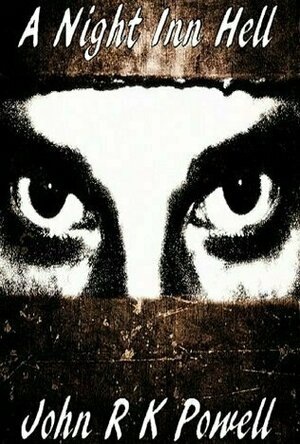Search
Hazel (1853 KP) rated Clover Moon in Books
Dec 7, 2018
<i>This eBook was provided by the publisher via NetGalley in exchange for an honest review </i>
Although now in her seventies, the Nation’s favourite children’s author, Dame Jacqueline Wilson, is continuing to write after surpassing one hundred novels. Many children (mostly girls) grow up reading her stories, myself being amongst that number. Even my sister, who hated reading, purchased a number of her books. It has been well over a decade since I last read a Jacqueline Wilson, however after seeing her latest novel was available for review, I thought I would give it a go.
<i>Clover Moon</i> is set in poverty-stricken Victorian London, where eleven-year-old Clover, the eldest of six siblings, lives with her father and stepmother. Like many stepmother’s in children’s literature, Clover’s treats her like a slave – a position she is destined to stay in unless she gets a job in a factory. With no school to attend, Clover becomes a second mother to her younger brother’s and sisters, yet nothing can prepare her for the devastating impact a wave of Scarlet Fever brings. With only an old doll maker who cares about her, Clover is desperate to get out of her situation; so after a chance meeting with an artist who tells her about a home for destitute girls, Clover decides to seek out the help and life she deserves.
Although only eleven, Clover has the responsibilities of someone of a more mature age. It is hard to imagine sending a child out to work, or trusting them to look after a newborn baby. Children reading this book will learn the difference between their lives and the life of a child in the 1800s.
As always, Jacqueline Wilson gives her main character a happy ending – although in this instance it still remains a bit uncertain. Despite the horrible circumstances, Wilson manages to pump her story full of enthusiastic optimism, thus portraying Clover as a strong, determined heroine.
Most of Jacqueline Wilson’s earlier books were set in the present day; there were still unhappy situations, but the settings were based on ideas the reader would be familiar with. In the case of <i>Clover Moon</i>, unless children have been educated about the poor in Victorian England, it is unlikely that they will be able to fully comprehend Clover’s predicament. As a result, the book is more suitable for young teenagers than the usual target audience of eight to twelve year olds.
Comparing my memories of Jacqueline Wilson books I read as a child with her latest publication, <i>Clover Moon</i> felt like something different; a new direction. As I have not read any of her work between the early 2000s and now, I am not sure when this change occurred, but it feels as though Wilson is delving deeper into her main character’s thoughts and feelings, and creating a more insightful storyline. On the other hand, I may simply be more intuitive as an adult than I was a child.
Although <i>Clover Moon</i> did not turn out to be the style of writing I was expecting I thoroughly enjoyed it. In fact, this difference made it possible to distance myself from the author’s renown, and treat it as an individual story. Clover is an admirable character who, through her narration, provides both an entertaining story and brief historical education. Fans of Jacqueline Wilson will not be disappointed with this latest publication; and if you are a new reader, <i>Clover Moon</i> is a great place to start.
Although now in her seventies, the Nation’s favourite children’s author, Dame Jacqueline Wilson, is continuing to write after surpassing one hundred novels. Many children (mostly girls) grow up reading her stories, myself being amongst that number. Even my sister, who hated reading, purchased a number of her books. It has been well over a decade since I last read a Jacqueline Wilson, however after seeing her latest novel was available for review, I thought I would give it a go.
<i>Clover Moon</i> is set in poverty-stricken Victorian London, where eleven-year-old Clover, the eldest of six siblings, lives with her father and stepmother. Like many stepmother’s in children’s literature, Clover’s treats her like a slave – a position she is destined to stay in unless she gets a job in a factory. With no school to attend, Clover becomes a second mother to her younger brother’s and sisters, yet nothing can prepare her for the devastating impact a wave of Scarlet Fever brings. With only an old doll maker who cares about her, Clover is desperate to get out of her situation; so after a chance meeting with an artist who tells her about a home for destitute girls, Clover decides to seek out the help and life she deserves.
Although only eleven, Clover has the responsibilities of someone of a more mature age. It is hard to imagine sending a child out to work, or trusting them to look after a newborn baby. Children reading this book will learn the difference between their lives and the life of a child in the 1800s.
As always, Jacqueline Wilson gives her main character a happy ending – although in this instance it still remains a bit uncertain. Despite the horrible circumstances, Wilson manages to pump her story full of enthusiastic optimism, thus portraying Clover as a strong, determined heroine.
Most of Jacqueline Wilson’s earlier books were set in the present day; there were still unhappy situations, but the settings were based on ideas the reader would be familiar with. In the case of <i>Clover Moon</i>, unless children have been educated about the poor in Victorian England, it is unlikely that they will be able to fully comprehend Clover’s predicament. As a result, the book is more suitable for young teenagers than the usual target audience of eight to twelve year olds.
Comparing my memories of Jacqueline Wilson books I read as a child with her latest publication, <i>Clover Moon</i> felt like something different; a new direction. As I have not read any of her work between the early 2000s and now, I am not sure when this change occurred, but it feels as though Wilson is delving deeper into her main character’s thoughts and feelings, and creating a more insightful storyline. On the other hand, I may simply be more intuitive as an adult than I was a child.
Although <i>Clover Moon</i> did not turn out to be the style of writing I was expecting I thoroughly enjoyed it. In fact, this difference made it possible to distance myself from the author’s renown, and treat it as an individual story. Clover is an admirable character who, through her narration, provides both an entertaining story and brief historical education. Fans of Jacqueline Wilson will not be disappointed with this latest publication; and if you are a new reader, <i>Clover Moon</i> is a great place to start.
Phil Leader (619 KP) rated The Kingdom Beyond the Waves in Books
Nov 18, 2019
Professor Amelia Harsh is a discredited academic, shunned by any university she could work for because of her obsession for the lost city of Camlantis which is dismissed by most as a myth. When all her other avenues dry up she grabs a lifeline from a rich industrialist to lead an expedition to find the last evidence of the city.
Meanwhile, why is someone graverobbing obsolete steamman corpses from cemetaries? And why has Furnace-breath Nick - scourge of Quatershift - been asked to break a prisoner free?
For those unfamiliar with Hunt's incredibly imaginative world - revealed in this book to likely be a far future version of our own which somehow mirrors certain aspects such as Victorian England and the French Revolution - would soon be at home in this book, particularly as half of the book involves a trip up a native-infested jungle river worthy of Conrad. Meanwhile the trail is being followed from the other end and the smoggy streets of Middlesteel in the country of Jackals by Furnace-breath Nick's not so mild mannered alter ego, Cornelius Fortune.
The way the story unfolds is very reminiscent of Saturday morning serials that used to be popular when not everyone had a television. There are a series of episodes where our heroes are put into peril and yet somehow (mostly) break free. The difference is in the mostly. Hunt is not afraid of killing off a character and that keeps the reader on the edge of their seat and turning the pages to see if that really was the end or there is a miraculous escape on the cards.
The inventiveness Hunt showed in The Court of the Air is very much still evident with a fiendish plot and fantastic ideas zinging off the page together with very clever dialog. Once again this is a book to read carefully and not to skim, it will be so much more rewarding.
All in all this is a stronger book than the first and the characters in it are terrific, heroes and villains alike. There are still Deus Ex Machina escapes here and there but they are on the whole consistent with the world of Jackals.
I would very much recommend this to anyone who likes their science fiction broad and heading to steam punk rather than space opera (although it's not really steam punk) and their adventure old-school swashbuckling. Terrific work.
Meanwhile, why is someone graverobbing obsolete steamman corpses from cemetaries? And why has Furnace-breath Nick - scourge of Quatershift - been asked to break a prisoner free?
For those unfamiliar with Hunt's incredibly imaginative world - revealed in this book to likely be a far future version of our own which somehow mirrors certain aspects such as Victorian England and the French Revolution - would soon be at home in this book, particularly as half of the book involves a trip up a native-infested jungle river worthy of Conrad. Meanwhile the trail is being followed from the other end and the smoggy streets of Middlesteel in the country of Jackals by Furnace-breath Nick's not so mild mannered alter ego, Cornelius Fortune.
The way the story unfolds is very reminiscent of Saturday morning serials that used to be popular when not everyone had a television. There are a series of episodes where our heroes are put into peril and yet somehow (mostly) break free. The difference is in the mostly. Hunt is not afraid of killing off a character and that keeps the reader on the edge of their seat and turning the pages to see if that really was the end or there is a miraculous escape on the cards.
The inventiveness Hunt showed in The Court of the Air is very much still evident with a fiendish plot and fantastic ideas zinging off the page together with very clever dialog. Once again this is a book to read carefully and not to skim, it will be so much more rewarding.
All in all this is a stronger book than the first and the characters in it are terrific, heroes and villains alike. There are still Deus Ex Machina escapes here and there but they are on the whole consistent with the world of Jackals.
I would very much recommend this to anyone who likes their science fiction broad and heading to steam punk rather than space opera (although it's not really steam punk) and their adventure old-school swashbuckling. Terrific work.
Lee (2222 KP) rated The Personal History of David Copperfield (2019) in Movies
Jan 26, 2020
Based on the famous and beloved novel by Charles Dickens, Armando Iannucci (Veep, The Thick of It, The Death of Stalin) brings us this fresh new take on David Copperfield. And it’s like no other Dickens adaptation you’ve ever seen before.
Dev Patel stars as Copperfield, the star and narrator of the story which charts his personal rise from rags to riches during Victorian England. We begin though with Copperfield as an adult, recounting his life story to a small theatre audience as he steps into a painted backdrop behind him on stage, transporting him, and us, to the location of his birth. He enters the family home and continues to narrate from within the scene as his mother struggles with labour. It’s just one of a variety of wonderfully inventive storytelling devices that the movie employs throughout.
While the chaos of childbirth plays out, the first in a long line of star-studded supporting characters arrives, David’s eccentric Aunt Betsey (Tilda Swinton), and we immediately get a glimpse of the kind of humour Iannucci has brought to the story as she sets about upsetting Peggotty, the family housekeeper, and declares that the baby will definitely be a girl.
From there, the storyline is fast paced, weaving between locations as David grows up - from an overturned boat house in Yarmouth, to the chaos of London and the difficulties of working in a bottle factory, and on to the Kent countryside. Along the way we meet yet more big names, including Peter Capaldi, Ben Whishaw, Hugh Laurie, Paul Whitehouse and Benedict Wong. Not to mention countless other recognisable faces.
The Personal History of David Copperfield is a real mixing pot of beautiful visuals, quirky humour and larger than life characters. Realism has been ditched in order to deliver a whimsical tale that is accessible to all ages. Unfortunately though, it just didn’t work for me. Aside from the opening scenes, and the occasional moment later on, the humour didn’t land at all. In fact, I got more laughs from the incredible movie Parasite that I saw just the night before seeing this.
Dev Patel, always impressive and enjoyable in everything he does, is charming as David Copperfield and is definitely the standout. Benedict Wong and Hugh Laurie were both enjoyable, but I felt the others all suffered from a script that just wasn’t strong enough. A beautifully shot movie, bold and bright and vibrant, but instantly forgettable.
Dev Patel stars as Copperfield, the star and narrator of the story which charts his personal rise from rags to riches during Victorian England. We begin though with Copperfield as an adult, recounting his life story to a small theatre audience as he steps into a painted backdrop behind him on stage, transporting him, and us, to the location of his birth. He enters the family home and continues to narrate from within the scene as his mother struggles with labour. It’s just one of a variety of wonderfully inventive storytelling devices that the movie employs throughout.
While the chaos of childbirth plays out, the first in a long line of star-studded supporting characters arrives, David’s eccentric Aunt Betsey (Tilda Swinton), and we immediately get a glimpse of the kind of humour Iannucci has brought to the story as she sets about upsetting Peggotty, the family housekeeper, and declares that the baby will definitely be a girl.
From there, the storyline is fast paced, weaving between locations as David grows up - from an overturned boat house in Yarmouth, to the chaos of London and the difficulties of working in a bottle factory, and on to the Kent countryside. Along the way we meet yet more big names, including Peter Capaldi, Ben Whishaw, Hugh Laurie, Paul Whitehouse and Benedict Wong. Not to mention countless other recognisable faces.
The Personal History of David Copperfield is a real mixing pot of beautiful visuals, quirky humour and larger than life characters. Realism has been ditched in order to deliver a whimsical tale that is accessible to all ages. Unfortunately though, it just didn’t work for me. Aside from the opening scenes, and the occasional moment later on, the humour didn’t land at all. In fact, I got more laughs from the incredible movie Parasite that I saw just the night before seeing this.
Dev Patel, always impressive and enjoyable in everything he does, is charming as David Copperfield and is definitely the standout. Benedict Wong and Hugh Laurie were both enjoyable, but I felt the others all suffered from a script that just wasn’t strong enough. A beautifully shot movie, bold and bright and vibrant, but instantly forgettable.
Brumpolarbears (22 KP) rated The Old Hellfire Club in Tabletop Games
Jun 18, 2019
UK Games Expo 2018 was every boardgame fan’s dream. From party games and family favourites to elaborate miniatures and fantasy RPGs. The credit card certainly took a bashing that weekend, but there was one game which we weren’t able to purchase (due to it not actually being out), yet it left a rather lasting impression.
In The Old Hellfire Club two to six players take on the roles of the destitute final members of an ancient aristocratic secret society as they recount the tales of their greatest adventures to the patrons of the shadiest public houses of Old London Town. Drawing on the cards in their hands for inspiration, players weave an ever more elaborate (although far from honest) tale of daring and adventure in the hope that the drinking den’s patrons will offer them a penny for their woes. As competition for the pennies on offer increases, so too do the exaggerations and outright lies players tell about their role in the story in the hope of making themselves seem more deserving. At any time, a player can challenge anothers versions of the story by playing a less impressive card from their own hand, thereby revealing the exaggeration and taking the rewards for the story. When the tale reaches its climax, whoever has been given the most pennies wins the game.
You can win pennies by getting away with telling extravagant lies about the adventures you had (by playing
high value Boast Cards without being successfully challenged by other players), through the charity of
strangers (by meeting the conditions set out on certain Patron Cards), and by satisfying the predilections of
the mysterious benefactors lurking in the audience (by successfully playing the most cards from a particular
suit over the course of the game).
While there’s still some time until you can physically purchase The Old Hellfire Club, which launches on Kickstarter on 9 April 2019, the developers have launched a free….yes free….print and play version of the game, meaning you can print your own copies of the cards and play with friends.
You can download a copy of the file by visiting The Old Hellfire Club’s profile on Boardgame Geek. I cannot rate this game highly enough. While I was sceptical at first because, in all honesty, I’m not that great at creating stories on the spot, especially those set in Victorian England, The Old Hellfire Club was incredibly quick to pick up. During the preview at UK Games Expo there were quite a few laughs, particularly when I joined Karl Marx for a gin or two. Who knows where future tales may lead.
In The Old Hellfire Club two to six players take on the roles of the destitute final members of an ancient aristocratic secret society as they recount the tales of their greatest adventures to the patrons of the shadiest public houses of Old London Town. Drawing on the cards in their hands for inspiration, players weave an ever more elaborate (although far from honest) tale of daring and adventure in the hope that the drinking den’s patrons will offer them a penny for their woes. As competition for the pennies on offer increases, so too do the exaggerations and outright lies players tell about their role in the story in the hope of making themselves seem more deserving. At any time, a player can challenge anothers versions of the story by playing a less impressive card from their own hand, thereby revealing the exaggeration and taking the rewards for the story. When the tale reaches its climax, whoever has been given the most pennies wins the game.
You can win pennies by getting away with telling extravagant lies about the adventures you had (by playing
high value Boast Cards without being successfully challenged by other players), through the charity of
strangers (by meeting the conditions set out on certain Patron Cards), and by satisfying the predilections of
the mysterious benefactors lurking in the audience (by successfully playing the most cards from a particular
suit over the course of the game).
While there’s still some time until you can physically purchase The Old Hellfire Club, which launches on Kickstarter on 9 April 2019, the developers have launched a free….yes free….print and play version of the game, meaning you can print your own copies of the cards and play with friends.
You can download a copy of the file by visiting The Old Hellfire Club’s profile on Boardgame Geek. I cannot rate this game highly enough. While I was sceptical at first because, in all honesty, I’m not that great at creating stories on the spot, especially those set in Victorian England, The Old Hellfire Club was incredibly quick to pick up. During the preview at UK Games Expo there were quite a few laughs, particularly when I joined Karl Marx for a gin or two. Who knows where future tales may lead.
Gareth von Kallenbach (980 KP) rated Pride and Prejudice and Zombies (2016) in Movies
Aug 6, 2019
As a fan of the Pride and Prejudice book by Jane Austen, I thought it was all kinds of wrong when I came across the parody novel Pride and Prejudice and Zombies, by Seth Grahame-Smith, that essentially Austen’s classic novel with elements of modern zombie fiction. Mainly because I’m not a fan of horror movies. So as we approached the theater where we were screening Pride and Prejudice and Zombies, I told my husband, “I really don’t want to watch this. I hate zombies.” He just laughed. “You hate zombies, but you watch Walking Dead. Just pretend it’s an episode of Walking dead. Just set near the Victorian era.” I admit, I do watch the Walking Dead but it’s the most stressful hour of television for me, and there are commercial breaks. This movie has a running time for this move was almost 2 hrs with no commercials.
But the movie got a giggle out of me in the first 5 minutes. And of course it made me gasp not long after. But Walking Dead has trained me well, and it wasn’t too long ago that I watched Hateful Eight, so I think I’m quite desensitized to blood and gore now, and in comparison, PPZ was relatively mild in that regard. It also had enough of the elements of the original story that fighting zombies actually became an entertaining digression. You know – beautiful young ladies, dashing young men, ballroom dancing, budding romance, zombie attack.
“To succeed in polite society, a young woman must be many things. Kind… well-read… and accomplished. But to survive in the world as WE know it, you’ll need… other qualities.” Those qualities include being skilled in the martial arts and weapons training, while wearing a corset –essentially making them Regency era bad-asses.
Because I don’t watch Downton Abbey, the last time I saw Lily James, who plays Elizabeth Bennett, she was brilliantly blond and sweetly keeping her promise to her mother to “have courage and be kind.” as Cinderella. In PPZ, she’s a fierce brunette who doesn’t take too kindly to Fitzwilliam Darcy, played by a sullen and haughty Sam Riley – another Disney alum, last seen as Diaval, Maleficent’s companion raven.
Where the Jane Austen’s Mr. Darcy is won over by Elizbeth’s charm and wit, PPZ’s Darcy is slowly won over by Elizabeth’s aggressive and bold battle skills. Adding the alternate history of how zombies came to be a part of Regency era England hurried the story along, so the romantic developments felt a bit rushed, but Riley’s Darcy was quite believable in his reluctant but growing admiration of Elizabeth.
I was pleasantly surprised by how much I enjoyed this movie, zombies and all. When you can get guys to cheer for some undead’s head getting blown off, and still make the ladies sigh for the romance, you have a pretty perfect date movie. It may very well be my favorite period costume romantic zombie action film.
But the movie got a giggle out of me in the first 5 minutes. And of course it made me gasp not long after. But Walking Dead has trained me well, and it wasn’t too long ago that I watched Hateful Eight, so I think I’m quite desensitized to blood and gore now, and in comparison, PPZ was relatively mild in that regard. It also had enough of the elements of the original story that fighting zombies actually became an entertaining digression. You know – beautiful young ladies, dashing young men, ballroom dancing, budding romance, zombie attack.
“To succeed in polite society, a young woman must be many things. Kind… well-read… and accomplished. But to survive in the world as WE know it, you’ll need… other qualities.” Those qualities include being skilled in the martial arts and weapons training, while wearing a corset –essentially making them Regency era bad-asses.
Because I don’t watch Downton Abbey, the last time I saw Lily James, who plays Elizabeth Bennett, she was brilliantly blond and sweetly keeping her promise to her mother to “have courage and be kind.” as Cinderella. In PPZ, she’s a fierce brunette who doesn’t take too kindly to Fitzwilliam Darcy, played by a sullen and haughty Sam Riley – another Disney alum, last seen as Diaval, Maleficent’s companion raven.
Where the Jane Austen’s Mr. Darcy is won over by Elizbeth’s charm and wit, PPZ’s Darcy is slowly won over by Elizabeth’s aggressive and bold battle skills. Adding the alternate history of how zombies came to be a part of Regency era England hurried the story along, so the romantic developments felt a bit rushed, but Riley’s Darcy was quite believable in his reluctant but growing admiration of Elizabeth.
I was pleasantly surprised by how much I enjoyed this movie, zombies and all. When you can get guys to cheer for some undead’s head getting blown off, and still make the ladies sigh for the romance, you have a pretty perfect date movie. It may very well be my favorite period costume romantic zombie action film.
Movie Metropolis (309 KP) rated The Legend of Tarzan (2016) in Movies
Jun 11, 2019
CPR Needed
As tends to be the case with Hollywood, studios pay very close attention to their rivals release schedules, eyeing up potential competition to pit their films against, maxing box-office returns in the process.
And when Disney announced they were rebooting The Jungle Book in March this year, Warner Bros quickly responded with another jungle-themed film; The Legend of Tarzan. But does this interpretation on the classic character swing or fall?
It’s been nearly a decade since Tarzan (Alexander Skarsgård), aka John Clayton III, left Africa to live in Victorian England with his wife Jane (Margot Robbie). Danger lurks on the horizon as Leon Rom (Christoph Waltz), a treacherous envoy for King Leopold, devises a scheme that lures the couple and friend George Williams (Samuel L Jackson) to the Congo. Rom plans to capture Tarzan and deliver him to an old enemy in exchange for diamonds. When Jane becomes a pawn in his devious plot, Tarzan must return to the jungle to save the woman he loves.
Directed by David Yates (Harry Potter & the Deathly Hallows), Legend of Tarzan features committed performances from its lead cast, immersive scenery and impressive special effects, but all of the glitz can’t save a film that plods along at a dreadful pace. Not since Peter Jackson’s King Kong has there been a movie that wastes so much of its opening act.
Alexander Skarsgård is likeable and commanding as the titular character, but lacks enough acting prowess to tackle the deeper, more emotional side that writers Adam Cozad and Craig Brewer have brought to the table here. Therefore, the scenes featuring a solo Tarzan suffer somewhat and Samuel L Jackson feels wasted in a poorly written and half-hearted role.
It is in Margot Robbie and Christoph Waltz that we find the film’s saving graces. Their characters leap off the screen with Waltz in particular being a highlight throughout. It’s unfortunate that one of our greatest living actors is lambasted with poor dialogue however, though the script just about keeps him afloat.
David Yates brings a similar filming style here to that of his foray into Harry Potter. The action is confidently filmed, but he avoids the use of shaky-cam that many directors seem to find appealing nowadays. The CGI is on the whole very good, especially in the finale which is breath-taking to watch.
It’s just a shame the rest of the film is such a drag. The first hour is incredibly poorly paced with very brief, albeit well-filmed, action sequences not doing enough to brighten Legend of Tarzan up. Elsewhere, the use of flashbacks is at first a decent way of giving the audience some exposition, but after the tenth one, they’re a nuisance.
Overall, The Legend of Tarzan does a lot more with its iconic character than other films have done, but that doesn’t excuse its poor pacing. Thankfully, the exciting finale lifts the final act above the standard of the first hour, and commanding performances from all the cast sustain interest just about enough to see it through to the end.
https://moviemetropolis.net/2016/07/07/cpr-needed-the-legend-of-tarzan-review/
And when Disney announced they were rebooting The Jungle Book in March this year, Warner Bros quickly responded with another jungle-themed film; The Legend of Tarzan. But does this interpretation on the classic character swing or fall?
It’s been nearly a decade since Tarzan (Alexander Skarsgård), aka John Clayton III, left Africa to live in Victorian England with his wife Jane (Margot Robbie). Danger lurks on the horizon as Leon Rom (Christoph Waltz), a treacherous envoy for King Leopold, devises a scheme that lures the couple and friend George Williams (Samuel L Jackson) to the Congo. Rom plans to capture Tarzan and deliver him to an old enemy in exchange for diamonds. When Jane becomes a pawn in his devious plot, Tarzan must return to the jungle to save the woman he loves.
Directed by David Yates (Harry Potter & the Deathly Hallows), Legend of Tarzan features committed performances from its lead cast, immersive scenery and impressive special effects, but all of the glitz can’t save a film that plods along at a dreadful pace. Not since Peter Jackson’s King Kong has there been a movie that wastes so much of its opening act.
Alexander Skarsgård is likeable and commanding as the titular character, but lacks enough acting prowess to tackle the deeper, more emotional side that writers Adam Cozad and Craig Brewer have brought to the table here. Therefore, the scenes featuring a solo Tarzan suffer somewhat and Samuel L Jackson feels wasted in a poorly written and half-hearted role.
It is in Margot Robbie and Christoph Waltz that we find the film’s saving graces. Their characters leap off the screen with Waltz in particular being a highlight throughout. It’s unfortunate that one of our greatest living actors is lambasted with poor dialogue however, though the script just about keeps him afloat.
David Yates brings a similar filming style here to that of his foray into Harry Potter. The action is confidently filmed, but he avoids the use of shaky-cam that many directors seem to find appealing nowadays. The CGI is on the whole very good, especially in the finale which is breath-taking to watch.
It’s just a shame the rest of the film is such a drag. The first hour is incredibly poorly paced with very brief, albeit well-filmed, action sequences not doing enough to brighten Legend of Tarzan up. Elsewhere, the use of flashbacks is at first a decent way of giving the audience some exposition, but after the tenth one, they’re a nuisance.
Overall, The Legend of Tarzan does a lot more with its iconic character than other films have done, but that doesn’t excuse its poor pacing. Thankfully, the exciting finale lifts the final act above the standard of the first hour, and commanding performances from all the cast sustain interest just about enough to see it through to the end.
https://moviemetropolis.net/2016/07/07/cpr-needed-the-legend-of-tarzan-review/
Gareth von Kallenbach (980 KP) rated A Christmas Carol (2009) in Movies
Aug 9, 2019
The timeless classic A Christmas Carol by Charles Dickens has been one of the most beloved and adapted stories in history. There have been numerous movies, plays, radio, and television shows that have told the story for several generations as well as adapted films such as “Scrooged” and “Ghosts of Girlfriends Past” which were inspired by the timeless tale of redemption.
The latest version of the film was created by Director Robert Zemeckis (who also wrote the screenplay for the film.) and presents it with stunning 3D effects.
The clever use of animation based on motion capture of the actors brings a new and unique look and style to the film that makes it contemporary yet does not diminish the Victorian England setting of the story.
In case you are one of the few that are not familiar with the tale, the story centers on a miserly curmudgeon, named Ebenezer Scrooge (Jim Carrey), who is so tight with a penny that he keeps the coal in his office locked up, forcing his employee Bob Crachit (Gary Oldman), to make do with one tiny piece a day during the cold of winter.
Scrooge has no love for anyone or anything aside from his work, and he spends his life in working and dispensing venom for all those that dare come into his world.
When he is invited to Christmas dinner by his nephew Fred (Colin Firth), Scrooge declines the offer abruptly and berates his nephew about the pointless nature of Christmas and how it serves no purpose. As if he was just getting warmed up, Scrooge then unleashes his fury on a local charity and informs them that if the needy were to die, then perhaps there would be less surplus population in the world.
Alone in his home on Christmas Eve, Scrooge is visited by the ghost of his old associate Jacob Marley, (Gary Oldman), who passed away seven years earlier. Marley is bound by the long chains he created in his life, and warns Scrooge not to make the mistakes he did and that there is still time for him to find redemption.
Scrooge is visited by the ghosts of Christmas past, present, and future who take Scrooge on a journey through his life, and show him the folly of his ways, and offer him a second chance to lead a better life with caring and compassion to all.
The solid cast really shines and many play multiple roles in the film. Carrey gives a strong performance and manages to reign in his over the top energy during the more dramatic parts of the film, and lets it out where appropriate. He subtly infuses comedy into the story without it ever taking the focus from the story.
The 3D effects were a real treat and it truly seemed like it was snowing in the theater and the numerous shots of London were truly amazing. While some may see it as a more modern adaptation, I found the film to be very true to the story, and was not only very entertaining, but a version that even Scrooge himself would enjoy as this is a new holiday classic that sets the bar for future adaptations of the story to aspire to.
The latest version of the film was created by Director Robert Zemeckis (who also wrote the screenplay for the film.) and presents it with stunning 3D effects.
The clever use of animation based on motion capture of the actors brings a new and unique look and style to the film that makes it contemporary yet does not diminish the Victorian England setting of the story.
In case you are one of the few that are not familiar with the tale, the story centers on a miserly curmudgeon, named Ebenezer Scrooge (Jim Carrey), who is so tight with a penny that he keeps the coal in his office locked up, forcing his employee Bob Crachit (Gary Oldman), to make do with one tiny piece a day during the cold of winter.
Scrooge has no love for anyone or anything aside from his work, and he spends his life in working and dispensing venom for all those that dare come into his world.
When he is invited to Christmas dinner by his nephew Fred (Colin Firth), Scrooge declines the offer abruptly and berates his nephew about the pointless nature of Christmas and how it serves no purpose. As if he was just getting warmed up, Scrooge then unleashes his fury on a local charity and informs them that if the needy were to die, then perhaps there would be less surplus population in the world.
Alone in his home on Christmas Eve, Scrooge is visited by the ghost of his old associate Jacob Marley, (Gary Oldman), who passed away seven years earlier. Marley is bound by the long chains he created in his life, and warns Scrooge not to make the mistakes he did and that there is still time for him to find redemption.
Scrooge is visited by the ghosts of Christmas past, present, and future who take Scrooge on a journey through his life, and show him the folly of his ways, and offer him a second chance to lead a better life with caring and compassion to all.
The solid cast really shines and many play multiple roles in the film. Carrey gives a strong performance and manages to reign in his over the top energy during the more dramatic parts of the film, and lets it out where appropriate. He subtly infuses comedy into the story without it ever taking the focus from the story.
The 3D effects were a real treat and it truly seemed like it was snowing in the theater and the numerous shots of London were truly amazing. While some may see it as a more modern adaptation, I found the film to be very true to the story, and was not only very entertaining, but a version that even Scrooge himself would enjoy as this is a new holiday classic that sets the bar for future adaptations of the story to aspire to.
Phil Leader (619 KP) rated The Court of the Air (Jackelian, #1) in Books
Nov 11, 2019
The land of Jackals is under threat. Ancient foes are threatening its people and its borders. Who can save the land?
Molly Templar is an orphan scratching a living in a poor house. But someone wants her very badly - badly enough to kill anyone who gets in the way. But who would want a poor orphan girl and why?
Oliver Brooks is an outcast. He was lost for two years in the feymist when he was younger. He must have been changed but shows no signs, he appears to be completely normal. But he still needs to report to the authorities regularly and lives in virtual house arrest with his uncle. Until his uncle is killed and Oliver barely escapes.
So begins The Court Of The Air, a stupendous rolling epic set in the strange land of Jackals, a place which is sort of like Victorian England but is also completely different. There are guns and airships, bombs and politicians aplenty. There is also magic and gods stalk the shadows of the world. Sentient steam driven robots have their own country and their own religion.
This is one of those immersive novels. Nothing is explained as it is seen from the viewpoint of the main characters, and they don't need to explain their own world to themselves. This might deter some readers because although there are some familiar concepts many are new or reworked in subtly different ways so that assumptions are dangerous. Personally I enjoy being thrown into the deep end and having to work at understanding the world of the author. I was definitely in my element.
Hunt has an amazing imagination. He is like the curator of a museum of wonders, allowing quick glimpses at the shiny trinkets before twitching aside the curtain to the rather more sinister exhibits he keeps in the basement. He also has a prose style that is frequently poetic and full of brilliant metaphor and simile. One of my favourites was describing a camera as having its nose pointing sadly downwards. And the writing is dense, very dense. I took my time over this book because it was worth it to extract every nuance and vibe conveyed by the words on the page.
The plot is sprawling and convoluted. Oliver and Molly are the main characters but there are others on all sides of the conflict and very little is as it seems or black and white. The first half of the book concerns Molly and Oliver being separately pursued as various aspects of Jackals' geography and politics are revealed (and the political systems are a hoot). Once we find out what is going on the pursued then must try to confront and thwart the danger, not only to them but to their country and the world.
The threads finally come together in a cataclysmic ending. The plot does unravel a little as everything happens at once and there are plenty of clever twists. There is a certain about of deus ex machina in the ending but I would rather that than a tedious few pages of exposition. The good guys win. The bad guys are vanquished. And it's all very entertaining.
Now I do accept that it is a challenging read and some people will not take to it so I can't recommend it without saying, read an excerpt first. If you like reading it (even if you don't as yet understand what half of it means) then read all of it. You will not be disappointed.
Rated: Some violence
Molly Templar is an orphan scratching a living in a poor house. But someone wants her very badly - badly enough to kill anyone who gets in the way. But who would want a poor orphan girl and why?
Oliver Brooks is an outcast. He was lost for two years in the feymist when he was younger. He must have been changed but shows no signs, he appears to be completely normal. But he still needs to report to the authorities regularly and lives in virtual house arrest with his uncle. Until his uncle is killed and Oliver barely escapes.
So begins The Court Of The Air, a stupendous rolling epic set in the strange land of Jackals, a place which is sort of like Victorian England but is also completely different. There are guns and airships, bombs and politicians aplenty. There is also magic and gods stalk the shadows of the world. Sentient steam driven robots have their own country and their own religion.
This is one of those immersive novels. Nothing is explained as it is seen from the viewpoint of the main characters, and they don't need to explain their own world to themselves. This might deter some readers because although there are some familiar concepts many are new or reworked in subtly different ways so that assumptions are dangerous. Personally I enjoy being thrown into the deep end and having to work at understanding the world of the author. I was definitely in my element.
Hunt has an amazing imagination. He is like the curator of a museum of wonders, allowing quick glimpses at the shiny trinkets before twitching aside the curtain to the rather more sinister exhibits he keeps in the basement. He also has a prose style that is frequently poetic and full of brilliant metaphor and simile. One of my favourites was describing a camera as having its nose pointing sadly downwards. And the writing is dense, very dense. I took my time over this book because it was worth it to extract every nuance and vibe conveyed by the words on the page.
The plot is sprawling and convoluted. Oliver and Molly are the main characters but there are others on all sides of the conflict and very little is as it seems or black and white. The first half of the book concerns Molly and Oliver being separately pursued as various aspects of Jackals' geography and politics are revealed (and the political systems are a hoot). Once we find out what is going on the pursued then must try to confront and thwart the danger, not only to them but to their country and the world.
The threads finally come together in a cataclysmic ending. The plot does unravel a little as everything happens at once and there are plenty of clever twists. There is a certain about of deus ex machina in the ending but I would rather that than a tedious few pages of exposition. The good guys win. The bad guys are vanquished. And it's all very entertaining.
Now I do accept that it is a challenging read and some people will not take to it so I can't recommend it without saying, read an excerpt first. If you like reading it (even if you don't as yet understand what half of it means) then read all of it. You will not be disappointed.
Rated: Some violence
Phil Leader (619 KP) rated A Night Inn Hell in Books
Nov 21, 2019
This is the first book in a trilogy about a remote and haunted inn - the Hang Inn - where each book tells the story of how some of the souls came to be trapped there. The bulk of the story is set at the end of the 19th century, with the first and last chapters set in contemporary times and told from the point of view of one of the haunting spirits. In preparing to scare a couple of tourists visiting the notorious haunted in, the narrator tells the reader their story.
Peter and Stella have owned the Hang Inn for several months. The Inn is miles from the nearest town and sits among nearly impassable marshland. Trade is slow and they will soon need to think seriously about giving up the inn. Then they are given an offer they can't refuse by Jason, a police officer in a small and secretive unit that tracks down the worst murderers and serial killers in Victorian England and ensures that they are very quietly disposed of. The government will pay for the Hang Inn to be used for the executions. But this is a secret only a few can know, and Peter cannot even tell Stella what is really going on.
The first infamous murderer is executed and Peter begins to doubt he has made the right decision but it is too late. And when the second murderer arrives the ghost of the first torments both him and Peter. How long can Peter keep the secret and what impact will it have on his relationship with Stella?
This is not a ghost story in the conventional sense. The first murderer does haunt the inn some of the nights but most of the story is taken up the effect the situation has on Peter, Stella and Jason as it turns each of their lives upside down and tests each of them. The secret of the executions reveals deeper and darker secrets and the inner character of each of the main protagonists. There are night time chases across the marshes and murders are described and committed.
The plot twists and turns as each victim brought to the inn tells their own story and this has its inevitable effect on Peter and Stella as well as Jason. The relationship between the three of them changes as time goes on. We know that ultimately one of them will be left haunting the inn, but which one? Only the final climactic scenes reveal this.
The book is an enjoyable read, although the nights when the murderers are held in the inn are a lot more gripping and interesting than the periods between which can seem a little over-long with a lot of introspection from the main characters as they try to deal with what is going on around them (and within them). But this does allow the characters to grow, and the interactions between them and the state of their own minds plays a vital role in everything that happens.
The strength of the book lies in the twin strands of the overall story itself and of the murderers. Each is different and each is portrayed excellently by Powell from evil psychopaths to those who feel their actions are justified. Each tells their story in detail with some deft twists to enable this to happen.
Overall this was an enjoyable novel with enough action and twists to keep the reader's interest throughout.
Rating: Scenes of murder and some sexual references
Peter and Stella have owned the Hang Inn for several months. The Inn is miles from the nearest town and sits among nearly impassable marshland. Trade is slow and they will soon need to think seriously about giving up the inn. Then they are given an offer they can't refuse by Jason, a police officer in a small and secretive unit that tracks down the worst murderers and serial killers in Victorian England and ensures that they are very quietly disposed of. The government will pay for the Hang Inn to be used for the executions. But this is a secret only a few can know, and Peter cannot even tell Stella what is really going on.
The first infamous murderer is executed and Peter begins to doubt he has made the right decision but it is too late. And when the second murderer arrives the ghost of the first torments both him and Peter. How long can Peter keep the secret and what impact will it have on his relationship with Stella?
This is not a ghost story in the conventional sense. The first murderer does haunt the inn some of the nights but most of the story is taken up the effect the situation has on Peter, Stella and Jason as it turns each of their lives upside down and tests each of them. The secret of the executions reveals deeper and darker secrets and the inner character of each of the main protagonists. There are night time chases across the marshes and murders are described and committed.
The plot twists and turns as each victim brought to the inn tells their own story and this has its inevitable effect on Peter and Stella as well as Jason. The relationship between the three of them changes as time goes on. We know that ultimately one of them will be left haunting the inn, but which one? Only the final climactic scenes reveal this.
The book is an enjoyable read, although the nights when the murderers are held in the inn are a lot more gripping and interesting than the periods between which can seem a little over-long with a lot of introspection from the main characters as they try to deal with what is going on around them (and within them). But this does allow the characters to grow, and the interactions between them and the state of their own minds plays a vital role in everything that happens.
The strength of the book lies in the twin strands of the overall story itself and of the murderers. Each is different and each is portrayed excellently by Powell from evil psychopaths to those who feel their actions are justified. Each tells their story in detail with some deft twists to enable this to happen.
Overall this was an enjoyable novel with enough action and twists to keep the reader's interest throughout.
Rating: Scenes of murder and some sexual references
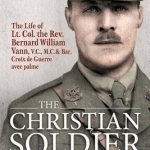
The Christian Soldier: The Life of Lt. Col. Bernard William Vann, V.C., M.C. and Bar, Croix De Guerre Avec Palmes
Book
Lieutenant Colonel the Rev Bernard William Vann, VC, MC & Bar, Croix de Guerre avec palme, was one...
